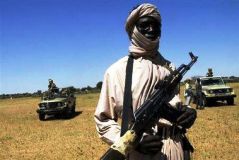Darfur enemies race to make peace before deadline
April 29, 2006 (ABUJA) — The warring parties from Sudan’s Darfur region struggled to extract a last few crucial concessions from each other on Saturday as they raced to meet a Sunday deadline for a peace deal set by the African Union (AU).
 International pressure grew on the Sudanese government and three Darfur rebel factions to accept the AU’s proposed peace agreement and end three years of violence that U.S. President George W. Bush called “genocide”.
International pressure grew on the Sudanese government and three Darfur rebel factions to accept the AU’s proposed peace agreement and end three years of violence that U.S. President George W. Bush called “genocide”.
The 85-page draft settlement is the result of two years of tough talks on security, power-sharing and wealth-sharing. Diplomats said the sides were thrashing out compromises on a small number of sticking points and a deal was in sight.
“They are engaging directly on two important points on security arrangements and if they crack those, the rest will follow. Security is the real key,” said one diplomatic source who is closely involved in the talks in the Nigerian capital.
The government has already signalled that despite some misgivings it is prepared to make a deal. But sources said Khartoum wanted amendments to a section on disarming the Janjaweed, militias it is accused of using to fight the rebels.
The sources said the rebels wanted changes to a section on integrating their forces into the Sudanese army, and that a trade-off was possible between the two issues.
The rebels said they were talking amongst themselves to seek a consensus on whether to sign. Decision-making is an arduous process for them as they are split into two movements and three factions with a history of infighting.
Apart from security, their main problem with the document is that it does not meet their demands for Darfur to get a new post of Sudanese vice president and a new regional government. They also have other objections on issues such as compensation.
“SAVE DARFUR” RALLIES
Rebels took up arms in ethnically mixed Darfur in early 2003 over what they saw as neglect by the Arab-dominated central government.
Khartoum used proxy Janjaweed militias drawn from Arab tribes to crush the rebellion. The fighting has killed tens of thousands of people while a campaign of arson, looting and rape has driven more than 2 million from their homes into refugee camps in Darfur and neighbouring Chad.
A truce was signed in 2004 but all sides have continued fighting, says the AU which has 7,000 peacekeepers in Darfur.
Diplomats in Abuja made intense efforts on Saturday to persuade the rebels to drop some demands, while in the United States the government of Sudan faced pressure to end violence.
Bush said “genocide in Sudan is unacceptable” and endorsed a series of “Save Darfur” rallies taking place across the United States on Sunday, organised by a coalition of more than 160 religious and humanitarian groups.
“I want the Sudanese government to understand the United States of America is serious about solving this problem,” Bush said.
The United States says it has taken the international lead on Sudan, but many experts say it has not been tough enough on Khartoum and failed to enlist powers such as Russia or China.
Bush announced new sanctions on Thursday against people suspected of aiding genocide in Darfur.
NATO ministers on Friday said they were ready to increase assistance in Darfur, but agreed any presence would be limited and only in support of AU or U.N. efforts.
(Reuters)
